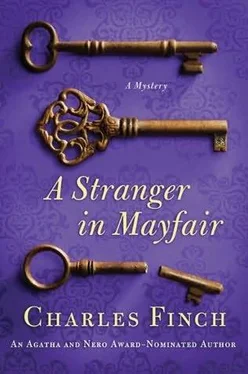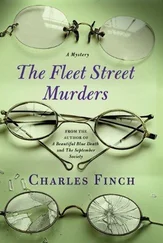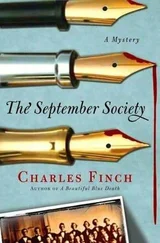Charles Finch - A Stranger in Mayfair
Здесь есть возможность читать онлайн «Charles Finch - A Stranger in Mayfair» весь текст электронной книги совершенно бесплатно (целиком полную версию без сокращений). В некоторых случаях можно слушать аудио, скачать через торрент в формате fb2 и присутствует краткое содержание. Жанр: Исторический детектив, на английском языке. Описание произведения, (предисловие) а так же отзывы посетителей доступны на портале библиотеки ЛибКат.
- Название:A Stranger in Mayfair
- Автор:
- Жанр:
- Год:неизвестен
- ISBN:нет данных
- Рейтинг книги:3 / 5. Голосов: 1
-
Избранное:Добавить в избранное
- Отзывы:
-
Ваша оценка:
- 60
- 1
- 2
- 3
- 4
- 5
A Stranger in Mayfair: краткое содержание, описание и аннотация
Предлагаем к чтению аннотацию, описание, краткое содержание или предисловие (зависит от того, что написал сам автор книги «A Stranger in Mayfair»). Если вы не нашли необходимую информацию о книге — напишите в комментариях, мы постараемся отыскать её.
A Stranger in Mayfair — читать онлайн бесплатно полную книгу (весь текст) целиком
Ниже представлен текст книги, разбитый по страницам. Система сохранения места последней прочитанной страницы, позволяет с удобством читать онлайн бесплатно книгу «A Stranger in Mayfair», без необходимости каждый раз заново искать на чём Вы остановились. Поставьте закладку, и сможете в любой момент перейти на страницу, на которой закончили чтение.
Интервал:
Закладка:
“That’s different.”
“How?”
“It’s your job.”
“Being a detective is my job, Jane.”
Lady Jane’s voice rose. “Not any longer!”
“As long as I live!”
“You’re in Parliament, Charles!”
“So that’s worth staying out late for? Are you ashamed to be married to a detective?”
She looked as if he had slapped her: suddenly still, suddenly silent. Without a further word she swept out of the room and ran up the stairs.
“Damn,” he said to the empty room.
He sat down, and as the anger burned out of him and he returned to his right mind he felt a deep anguish. Not only had they not fought on their honeymoon, they hadn’t fought in twenty years, that he could remember. There had been cross words, but never a true battle.
He worried that he had ruined their friendship, the best thing in his life, by telling her he loved her. “My heart is ever at your service,” Shakespeare had written, and it was the line Lenox always thought of when Jane came to mind. Might it be that he would have served her better by staying silent?
He went to bed disconsolate, and slept very little.
The next morning she was gone before he woke, though it was barely half past seven. He breakfasted alone, reading the papers as he munched on eggs and ham and gulped down two cups of coffee. The Emperor of Japan had married, according to the Times. A chap named Meiji, of all things, and his wife was called Shoken. She was three years older than her new husband, which had apparently been the greatest obstacle to their nuptials. Suddenly the problems of the house on Hampden Street seemed a little smaller. He smiled slightly as he finished the article. It would be all right.
Walking down to Whitehall before nine o’clock, he knew his mind ought to be on the meetings of the day, the blue books he had to read, lunch with his party leaders at Bellamy’s.
Instead he was focused entirely on Frederick Clarke’s anonymous money drop-offs.
What could they mean? He still favored the thought that there was some kind of fraudulence at play, but then why would he have anything delivered under the servants’ door? Wasn’t that a dead giveaway?
There was good news, however. The case might be perplexing, and domestic bliss elusive, but professional happiness was close at hand.
In his short time as Lenox’s political secretary, Graham had already proved a marvel. It had only been a few days, but he had filled each of them with furious activity, rarely sleeping longer than a few hours, the commitment he had always shown as a servant transferred to this new work. Aside from organizing the new office to within an inch of its life, he had gone over Lenox’s appointment book, deciphered which meetings were most important, and canceled the rest, something that would save the grateful Lenox several hours a day.
What was most impressive, though, was his quickly growing acquaintance. It took men years to know the various faces of Parliament, but Graham was a quick pupil. This was an unspoken but important fact of life in the House of Commons, and Lenox hadn’t known anything about it. Now, however, they walked the halls and various men Lenox had never laid eyes on nodded at them both. “The Marquess of Aldington’s secretary,” Graham would say, or “Hector Prime’s chief counselor.” Graham’s principal gift in detective work had always been infiltration-making friends in a pub or a kitchen-and he put that gift to use here now in these more exalted corridors.
The apotheosis of this talent in its political form came that morning. Graham was waiting at the Members’ Entrance, as he did every day now, when Lenox arrived.
“Good morning, sir,” he said. “In ten minutes you must sit down with the Board of Agriculture. After that-”
Here Graham broke off and nodded his head at an enormously tall, thin young man with a giant forehead. “How do you do?” he said.
“Excellently, Mr. Graham, I thank you.”
After the man had walked on, Lenox said in a low voice, “My God, that was Percy Field.”
“Yes, sir.”
“How on earth do you know him?”
Percy Field was the Prime Minister’s own assistant, a famously accomplished and imperious lad from Magdalene College, prodigiously intelligent, whom the PM himself had declared more important to Great Britain’s welfare than all but ten or twenty people. Field had little patience for most Members, let alone their secretaries.
“He snubbed me, until I took the liberty of inviting him to one of your Tuesdays, sir. I spoke to Lady Lenox in advance of the offer, and she readily consented. Mr. Field’s attitude was cold when I first approached him, but he quickly warmed.”
This was disingenuous; they were Lady Jane’s Tuesdays, as they had been for fifteen years, a gathering of London’s elite-say twenty or so people-in her drawing room. Even for Field an invitation would be a great coup.
“Well done, Graham. Extremely well done.”
They went inside, up to the cramped office, and began the day’s work. For the rest of the morning Lenox dutifully attended his meetings and read his blue books. The entire time, though, his mind was on the murder. As such it wasn’t quite a surprise when he heard himself saying to Graham, “Send my regrets to the one o’clock meeting, please. I’m going round to fetch Dallington. I have to go to Frederick Clarke’s funeral.”
Chapter Twelve
What was the proper form for a servant’s funeral? In general one attended, but then in general the deceased was old and respectable. What if there was the strong prospect of a title, which only scandal could preclude?
The moment Lenox laid eyes on Ludo Starling it was clear the man had been mulling over these questions all morning. In the event Ludo and his wife were present, but Tiberius and the Starling boys weren’t. Jack Collingwood, Jenny Rogers, and Betsy Mints sat in the second row. Alone in the first row was a large, thin woman, perhaps fifty years old but still well-looking, horsey and countryish. She wore a straw mourning bonnet, black, with a deep black crepe ribbon, a soft black gown, and a dark veil. When she turned back Lenox saw that she was rather plain-faced, but somehow still attractive.
“That must be the boy’s mother,” he whispered to Dallington as they took their seats several rows back. “The place of honor.”
“Don’t you feel a bit dodgy here?” asked the young lord. “We didn’t know him.”
Lenox nodded gravely. “Even so, we owe him our best, and this is a singular opportunity to see who he knew and what he was like.”
The funeral took place in a small, appealing Mayfair church, St. George’s, which Lenox knew the Starling family had generously endowed over the years. It was a distinguished building with tall white columns in front, steep stairs to the front door, and a high bell tower overhead, part of the Fifty Churches Act that Parliament had passed in the early eighteenth century at the behest of Queen Anne, to keep up with London’s expansion in population. A pious woman, Anne had wanted to ensure that all of her subjects were close to a church. In the end the project fell well short of its target-a dozen churches or so had gone up-but they had left their mark. The great architect Nicholas Hawksmoor had built many of them, and even the ones he didn’t build (like this) were in his style. They were called Queen Anne’s Churches now-all much of a piece, beautiful, high, very white, and somewhat severe. Given Ludo’s newfound affinity for discretion, it was surprising to find the service held in a firmly aristocratic church.
The most striking occurrence at the funeral happened just before the service began. With the church already full, six footmen in identical livery marched somberly down the center aisle and took an empty pew. They made for an arresting picture.
Читать дальшеИнтервал:
Закладка:
Похожие книги на «A Stranger in Mayfair»
Представляем Вашему вниманию похожие книги на «A Stranger in Mayfair» списком для выбора. Мы отобрали схожую по названию и смыслу литературу в надежде предоставить читателям больше вариантов отыскать новые, интересные, ещё непрочитанные произведения.
Обсуждение, отзывы о книге «A Stranger in Mayfair» и просто собственные мнения читателей. Оставьте ваши комментарии, напишите, что Вы думаете о произведении, его смысле или главных героях. Укажите что конкретно понравилось, а что нет, и почему Вы так считаете.












